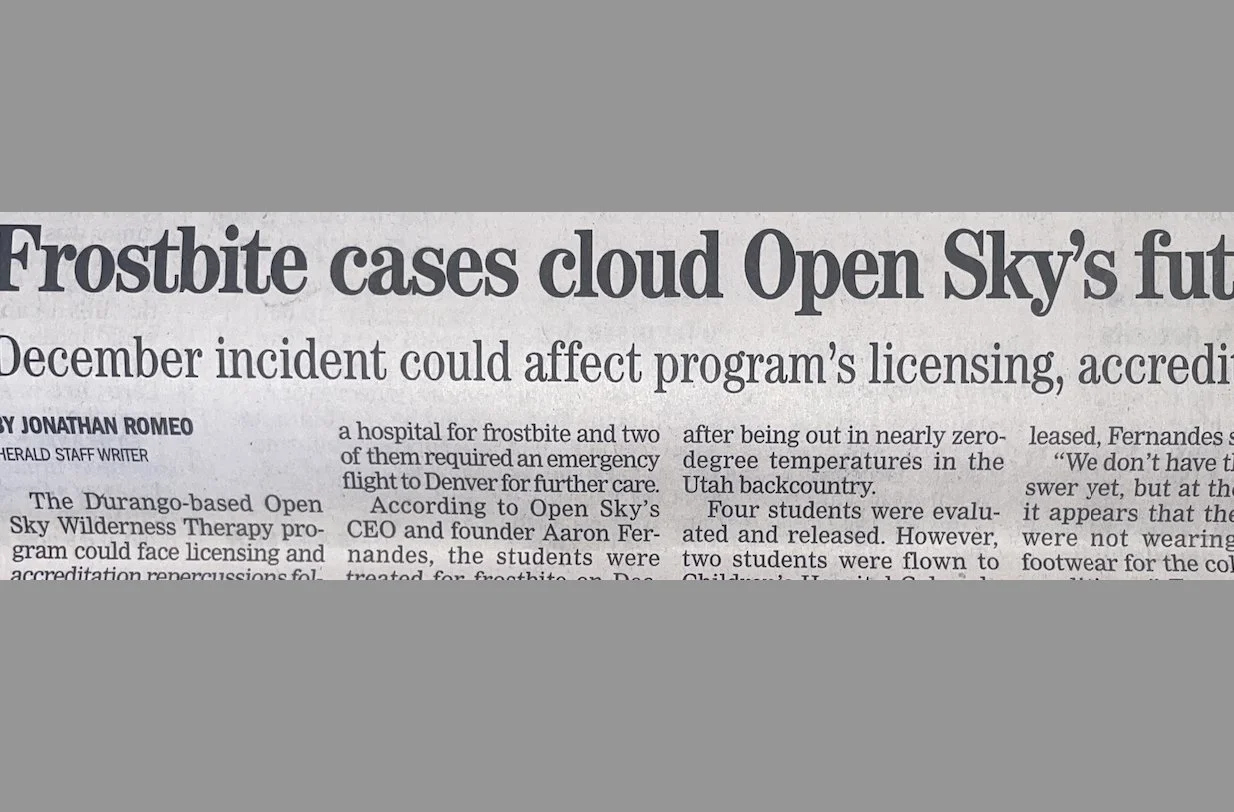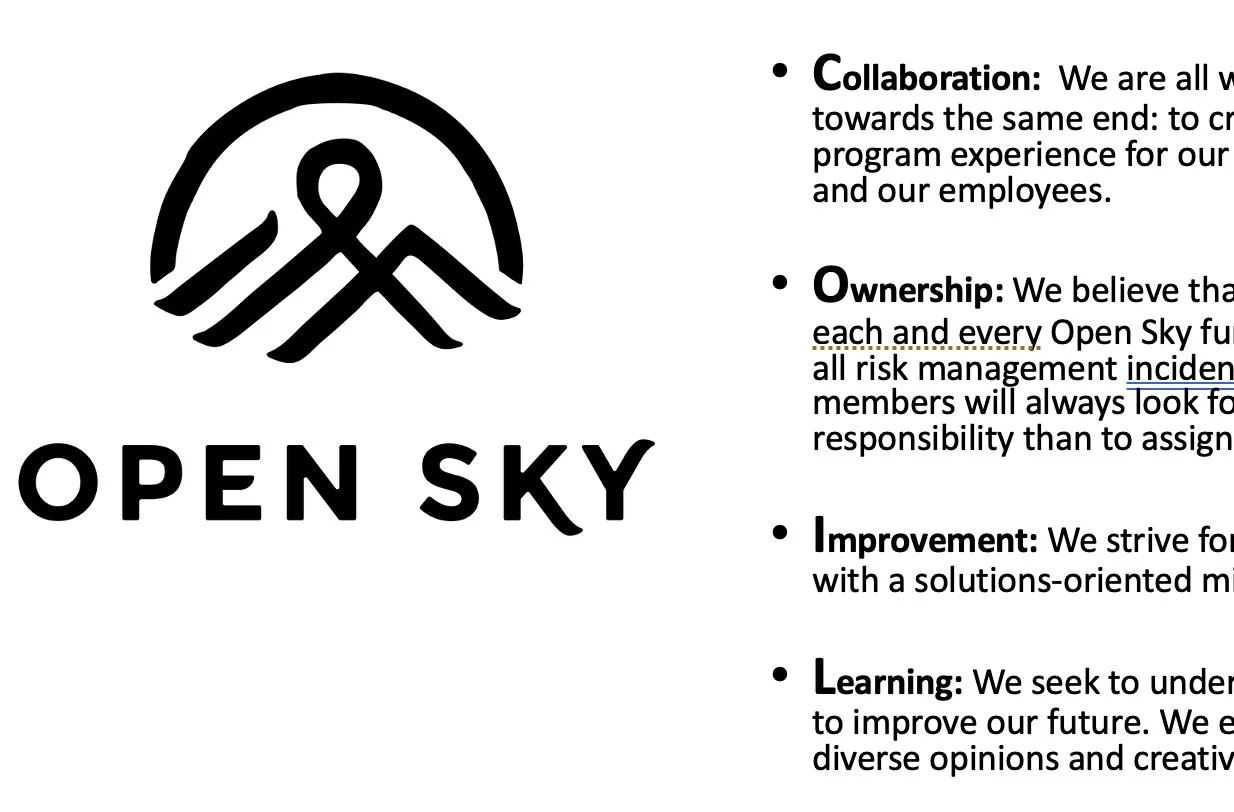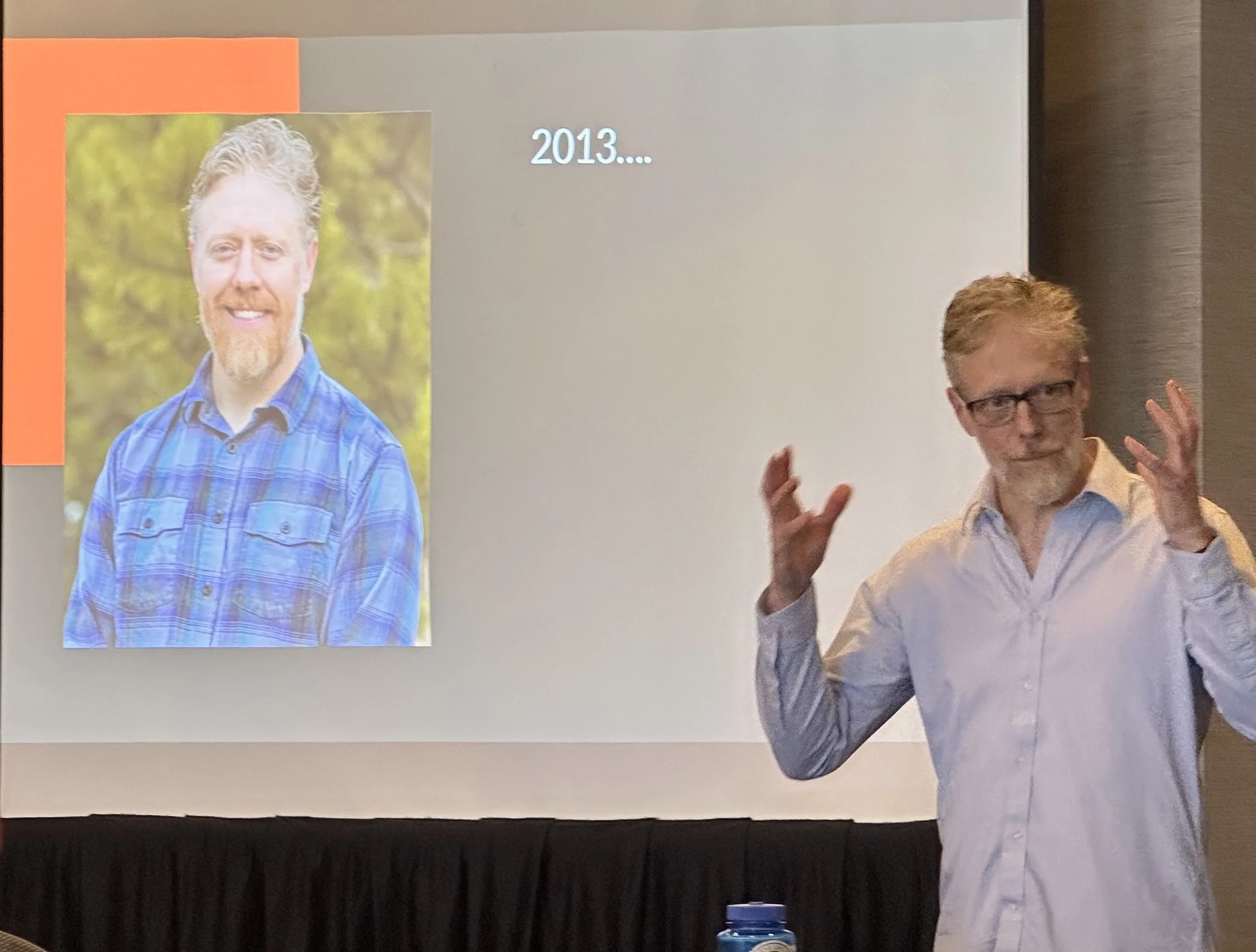When Things Go Wrong: What a Crisis Taught Me About Trust and Leadership
“Frostbite cases cloud Open Sky’s future” — Durango Herald Headline
It was a moment in time I won’t ever forget.
A quiet, cold, snowy December morning at home, celebrating the holidays with my wife and two boys, when my phone rang — the kind of call every leader dreads.
It was the CEO. He didn’t waste a second on pleasantries. His voice was tight, clipped, urgent. “Danny… we’ve had a serious incident.”
Within minutes, I learned the unthinkable: six students with frostbite. Two so severe they required immediate evacuation for advanced medical care. It was, without question, Open Sky’s darkest moment — the most shocking and devastating incident in our history.
It tested us in ways we couldn’t yet comprehend. And many of the lessons we now hold onto took years — and a lot of heartache — to fully understand.
For several days afterward, the stress was intense. We did everything we could to meet the needs in front of us. Students needed care. Parents needed information. The team needed guidance.
And then the headline hit. The kind that stops you cold — not only because young people were hurt, but because every leader knows what comes next: scrutiny, fear, questions, judgment, and pressure to react fast.
The pressure was immense.
State licensing wanted answers. Parents wanted answers. Referring professionals wanted answers. The media now wanted answers. Lawyers — on all sides — wanted answers. And internally, we wanted answers just as urgently.
Naturally, we asked: Who is at fault? Who let this happen? What broke down? Why did this happen? What must we change now?
We launched an internal investigation immediately. But for some, it didn’t feel like an investigation — it felt like an interrogation.
Truth be told, several people made serious mistakes. We felt compelled to “hold people accountable.” Some were let go. Some were reassigned.
Anxiety surged. Trust plummeted. Our culture contracted in on itself.
In those first days, we believed we were doing what leaders are supposed to do when everything goes wrong: isolate the problem, identify the culprits and causes, make changes, fix the system, reassure stakeholders.
But the harder we pushed for answers — the more tightly we clung to the idea of accountability-as-punishment — the further we drifted from the culture we desperately needed.
A culture where people feel safe speaking up when something doesn’t seem right. A culture rooted in togetherness. A culture that empowers the team. A culture resilient enough to bounce back when the next accident or failure inevitably occurs.
When You Work With People, Things Will Go Wrong
In therapeutic programs, we care for young people with complex mental and behavioral health needs. And one truth is unavoidable:
Things will go wrong.
Not because people don’t care. Not because leaders or staff are incompetent. But because humans are fallible, situations shift, conditions change, and no system is perfect.
What matters most — what shapes the culture that follows — is how we respond.
A Typical Leadership Response to a Crisis
In the aftermath of the frostbite incident, our organization felt the gravitational pull of the most common crisis response: Find the root cause. Hold people accountable.
Identify the people whose decisions contributed to the harm. Restore order through new policies and disciplinary action.
It’s a very human reaction.
But it also erodes trust faster than almost anything else leaders can do.
When we meet mistakes with blame, we unintentionally send a message:
“We don’t trust you. We know best. And we need to manage you.”
Morale drops. Engagement drops. Learning stops. Organizational resilience weakens at the exact moment it needs to strengthen.
People go inward. They build defenses. They avoid scrutiny, hesitate to ask for help, and shift blame wherever possible. They stop collaborating. They stop growing. They stop experimenting — even in small ways — because risk feels too dangerous.
But there is another way.
An Alternative Crisis Response
A healthier, more realistic, more humanistic approach begins with a simple assumption:
People show up wanting to do the right thing and give it their best.
And the outcomes we see — good or bad — are shaped by far more than individual actions:
the incentives they’re responding to
the constraints they’re navigating
the training they received
the clarity (or ambiguity) of expectations
the longstanding systems and culture influencing behavior
In other words: context shapes behavior.
This isn’t about excusing harmful actions. Deliberate wrongdoing must be addressed directly and decisively. But that is the exception — not the rule.
And often, the very factors that drive organizational success — incentives, constraints, training, expectations, systems — are the same factors that create the conditions for failure.
Most breakdowns result from systemic and cultural factors, not individual failings.
Resilience: The Power of a Just Culture
Organizations that thrive in high-stakes environments embrace what researcher Sidney Dekker calls a just culture — an environment that promotes accountability while recognizing the complex conditions in which decisions are made.
At Open Sky, I formalized this approach through the development of the COIL Model:
Collaboration — We are intertwined as members of a common organization and are more effective when we intentionally work together.
Ownership — Every person plays a role in every success and every failure, no matter how large or small. No one individual or single function is solely responsible.
Improvement — Lessons learned are applied to continuously refine our practices.
Learning — Every incident, misstep, near miss, and success presents opportunities for insight and growth.
Turning Crisis on Its Head
When we adopted the COIL framework at Open Sky, something remarkable happened:
Trust grew. Engagement increased. Organizational resilience followed.
Leadership felt less stress because the weight was shared. Challenges and crises became opportunities for growth and learning — a recipe for continued success.
Every Crisis is a Chance to Build Trust and Resilience
React with fear and blame, or respond with curiosity and ownership.
One erodes trust; the other builds it.
One narrows learning; the other expands it.
One divides the organization; the other unites it.
In my upcoming February presentation at the National Association of Therapeutic Schools and Programs annual conference, I’ll explore this dynamic more deeply — including the frostbite incident that revealed how even well-intentioned responses can erode trust and how leaders can build an alternative culture that builds resilience and maintains psychological safety.
The author presenting on the importance of effective leadership at Young Adult Transition Association (YATA) conference.
While no organization can prevent every mistake, every organization can learn to respond in ways that strengthen — not fracture — the culture needed to thrive.
It starts with leaders choosing trust over fear, learning over defensiveness, and ownership over blame.
If you’d like to learn more about building resilient culture and fostering collaboration in your organization — or in how you lead — please reach out. I’d love to hear from you.




